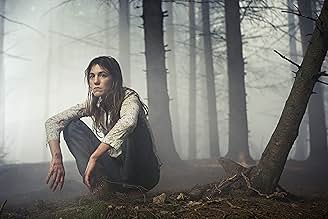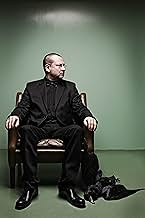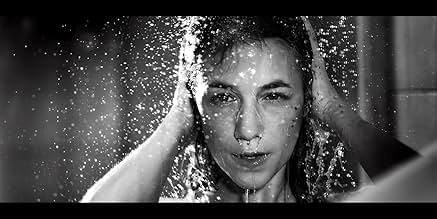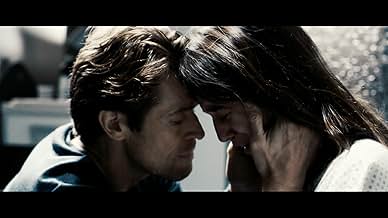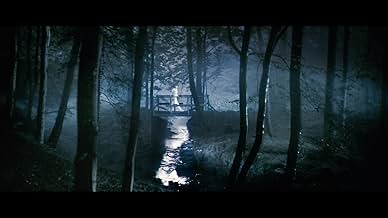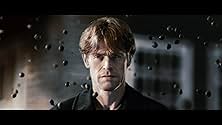एक दुःखी युगल अपने टूटे हुए दिलों और बिगड़ते विवाह को सुधारने की उम्मीद करते हैं. लेकिन प्रकृति अपना कर्स देती है और चीजें खराब से बदतर होती चली जाती हैं.एक दुःखी युगल अपने टूटे हुए दिलों और बिगड़ते विवाह को सुधारने की उम्मीद करते हैं. लेकिन प्रकृति अपना कर्स देती है और चीजें खराब से बदतर होती चली जाती हैं.एक दुःखी युगल अपने टूटे हुए दिलों और बिगड़ते विवाह को सुधारने की उम्मीद करते हैं. लेकिन प्रकृति अपना कर्स देती है और चीजें खराब से बदतर होती चली जाती हैं.
- निर्देशक
- लेखक
- स्टार
- निर्देशक
- लेखक
- स्टार
- पुरस्कार
- 21 जीत और कुल 33 नामांकन
फ़ीचर्ड समीक्षाएं
John Doe says in "Se7en": "Wanting people to pay attention, you can't just tap them on the shoulder. You have to hit them in the head with a sledgehammer." L. von Trier was tapping on the shoulder with "Dogville". He turns to a sledgehammer with "Antichrist". The problem is that when you have been hit by the extremities of his latest endeavor the most appropriate question you may want to ask seems to be suggested by the next line of the late detective Mills: "What makes you so special that people should pay attention?"
This movie doesn't strike as an overt emotional manipulation like "Dancer in the Dark" (the fact that the latter is really something that can be described in such a way was eventually admitted even by the director himself). The cinematography is stunning - in a good sense of the word. Several frames with Willem Dafoe's face will certainly enter the gallery of iconic images provided by modern cinema. Even the dedication to Tarkovsky was not vain. But von Trier is neither stupid/ talentless nor childish/egocentric - hopefully, at least - to the extent to actually consider making movies a kind of therapy, and the screening room his own private couch at a shrink's. So he is trying to bring in a meaning here after all. If so what is it?
What is that point he is trying to deliver? Human nature is far from being perfect? It's hardly new news. The aesthetic audacity and harshness of images in "Dogville" were fully justified by a consistency of its message, which they conveyed in a completely adequate way. As far as I can see, von Trier was talking then about the unbearable hypocrisy of our modern civilization and an inevitable catastrophe this civilization is heading for (while his account made I'm afraid a pretty accurate description of the actual situation). What does he have to add with this feature? Is it that all evil which falls upon people is intrinsically immanent in human nature? Having experienced or witnessed a critical amount of grief, pain and despair man comes to some point when even a concept of good, God, hope or whatever you call it is becoming virtually inconceivable? And after that chaos reigns? That to fight that man has to kill an evil in himself which he might love? But this fight is doomed anyway if a natural arena for it happens to be a world "issued by Satan"? It's a kindergarten philosophy. Some of these things may very well be true and correct, but to make all these daring assumptions and observations it's quite sufficient to have read a dozen of books or had just one good look around. There can be several more interpretations - some somewhat less coherent, some even more banal. What are justifications of all this excruciating imagery we encounter in "Antichrist" then? It's not quite clear.
So I should say that it is a bit surprising that the audience has happened to be so polarized. In fact, this movie is neither too good, nor too bad. And I might be missing something but I have a strong feeling that von Trier can be quite justly accused on this particular occasion of doing something he was quite wrongly accused of doing on some previous ones - of trying to compensate in a badly provocative manner a certain shallowness of his work and its half-baked message by the extremities of the way in which they are presented.
This movie doesn't strike as an overt emotional manipulation like "Dancer in the Dark" (the fact that the latter is really something that can be described in such a way was eventually admitted even by the director himself). The cinematography is stunning - in a good sense of the word. Several frames with Willem Dafoe's face will certainly enter the gallery of iconic images provided by modern cinema. Even the dedication to Tarkovsky was not vain. But von Trier is neither stupid/ talentless nor childish/egocentric - hopefully, at least - to the extent to actually consider making movies a kind of therapy, and the screening room his own private couch at a shrink's. So he is trying to bring in a meaning here after all. If so what is it?
What is that point he is trying to deliver? Human nature is far from being perfect? It's hardly new news. The aesthetic audacity and harshness of images in "Dogville" were fully justified by a consistency of its message, which they conveyed in a completely adequate way. As far as I can see, von Trier was talking then about the unbearable hypocrisy of our modern civilization and an inevitable catastrophe this civilization is heading for (while his account made I'm afraid a pretty accurate description of the actual situation). What does he have to add with this feature? Is it that all evil which falls upon people is intrinsically immanent in human nature? Having experienced or witnessed a critical amount of grief, pain and despair man comes to some point when even a concept of good, God, hope or whatever you call it is becoming virtually inconceivable? And after that chaos reigns? That to fight that man has to kill an evil in himself which he might love? But this fight is doomed anyway if a natural arena for it happens to be a world "issued by Satan"? It's a kindergarten philosophy. Some of these things may very well be true and correct, but to make all these daring assumptions and observations it's quite sufficient to have read a dozen of books or had just one good look around. There can be several more interpretations - some somewhat less coherent, some even more banal. What are justifications of all this excruciating imagery we encounter in "Antichrist" then? It's not quite clear.
So I should say that it is a bit surprising that the audience has happened to be so polarized. In fact, this movie is neither too good, nor too bad. And I might be missing something but I have a strong feeling that von Trier can be quite justly accused on this particular occasion of doing something he was quite wrongly accused of doing on some previous ones - of trying to compensate in a badly provocative manner a certain shallowness of his work and its half-baked message by the extremities of the way in which they are presented.
Much as I hate to see personal heroes go down, this was a letdown in every way.
I'm betting that just about everything filmed in slo-mo, black&white & set to a classical tune is likely to seem wonderful. It's such a cheap trick! How can people say that the prologue is wonderful/brilliant etc, when it's a mere legerdemain of the lowest kind? I mean, get together a cute baby, a washing machine and a couple having explicit sex, and you have not a brilliant scene, but a brainless, comfortable attempt at stirring emotion. Bah.
In fact, the entire movie suffers from a lack of creativity: the ominous atmosphere is suggested by heavy fog (I mean fog machines), a fox speaks (everybody burst out laughing, no wonder!), a crow refuses to die despite being hit over the head repeatedly. How much must we suffer for von Trier's shortage of original artistic vision!
As for the rest, a friend explained it had to do with seeing women as intrinsically threatening because of their sexual drive. I recommend Odishon for that - more intelligent, less cheap.
I'm betting that just about everything filmed in slo-mo, black&white & set to a classical tune is likely to seem wonderful. It's such a cheap trick! How can people say that the prologue is wonderful/brilliant etc, when it's a mere legerdemain of the lowest kind? I mean, get together a cute baby, a washing machine and a couple having explicit sex, and you have not a brilliant scene, but a brainless, comfortable attempt at stirring emotion. Bah.
In fact, the entire movie suffers from a lack of creativity: the ominous atmosphere is suggested by heavy fog (I mean fog machines), a fox speaks (everybody burst out laughing, no wonder!), a crow refuses to die despite being hit over the head repeatedly. How much must we suffer for von Trier's shortage of original artistic vision!
As for the rest, a friend explained it had to do with seeing women as intrinsically threatening because of their sexual drive. I recommend Odishon for that - more intelligent, less cheap.
Down the road from me is a coven of Christian filmmakers. It is a school and the purpose is to make films that evangelize. This fascinates me; generally their stories are about fighting the devil, a narrative that encompasses both what is in the film and what surrounds the making of the film. Some day, they might make engaging films and who knows what will happen.
This interests me because most movies are made by professional storytellers. Scorcese and Fincher (for example) not only makes a wide variety of stories, but they deliberately do so. The connection with their lives is — with few exceptions — with the art. Most singers are this way as well. Connected with this is films that have a love story that features a woman the male filmmaker is in love with. This often grabs me.
Now here we have a man deeply depressed, possessed. He makes a film painfully pulled from his soul, so difficult in the making that he is suicidal. It works. It is so deeply disturbing that I caution you to stay away from it. I was a bit vulnerable when encountering this world and it affected me.
Lars von Trier has built a life making films that exploit experiments in convention. I find them interesting, but there is always an academic distance that keeps them from connecting. They engage for how they are made, not what they are. At each juncture, I wonder how powerful a film might be if he used what he knows to communicate, rather than to practice. Now I know. He was so depressed he simply made. Looking at the usual areas where he is disciplined, you can see he is sloppy. Everything is imprecise. There is no theory at work here. Where it is technically competent, it is only temporarily so. That is what makes it so, so very powerful. His gush of expression floods past his constraints of Danish discipline.
The story is identical to "Don't Look Now." We as viewers think we see a child lost, and follow a couple in a grief that swallows them. But we see it from the husband's untrusted eye. He is confused, haunted, magically twisted through the sexual magic he and we see but which permeates and guides the narrative. This is a tornado of witchcraft, like the Roeg film, but from a filmmaker within it. Causal mechanics are not what we think we know from the beginning. The shoes are reversed. I do not know from outside sources what caused his depression, but it is pretty clear from this desperate message from within.
There are some pretty powerful images here. Some involve genitals, an ordinarily off-limits zone. Some involve a graceful death of an infant, made more terrifying by the beauty in which we receive it. Some involve damaged animals. Each of these is amplified by the rush of emotional confusion, the onanistic waterfall of acorns on the tin roof. Experience this at your peril.
The actors are incredible.
Ted's Evaluation -- 3 of 3: Worth watching.
This interests me because most movies are made by professional storytellers. Scorcese and Fincher (for example) not only makes a wide variety of stories, but they deliberately do so. The connection with their lives is — with few exceptions — with the art. Most singers are this way as well. Connected with this is films that have a love story that features a woman the male filmmaker is in love with. This often grabs me.
Now here we have a man deeply depressed, possessed. He makes a film painfully pulled from his soul, so difficult in the making that he is suicidal. It works. It is so deeply disturbing that I caution you to stay away from it. I was a bit vulnerable when encountering this world and it affected me.
Lars von Trier has built a life making films that exploit experiments in convention. I find them interesting, but there is always an academic distance that keeps them from connecting. They engage for how they are made, not what they are. At each juncture, I wonder how powerful a film might be if he used what he knows to communicate, rather than to practice. Now I know. He was so depressed he simply made. Looking at the usual areas where he is disciplined, you can see he is sloppy. Everything is imprecise. There is no theory at work here. Where it is technically competent, it is only temporarily so. That is what makes it so, so very powerful. His gush of expression floods past his constraints of Danish discipline.
The story is identical to "Don't Look Now." We as viewers think we see a child lost, and follow a couple in a grief that swallows them. But we see it from the husband's untrusted eye. He is confused, haunted, magically twisted through the sexual magic he and we see but which permeates and guides the narrative. This is a tornado of witchcraft, like the Roeg film, but from a filmmaker within it. Causal mechanics are not what we think we know from the beginning. The shoes are reversed. I do not know from outside sources what caused his depression, but it is pretty clear from this desperate message from within.
There are some pretty powerful images here. Some involve genitals, an ordinarily off-limits zone. Some involve a graceful death of an infant, made more terrifying by the beauty in which we receive it. Some involve damaged animals. Each of these is amplified by the rush of emotional confusion, the onanistic waterfall of acorns on the tin roof. Experience this at your peril.
The actors are incredible.
Ted's Evaluation -- 3 of 3: Worth watching.
Antichrist (2009)
*** 1/2 (out of 4)
Thought provoking but highly controversial film from von Trier has a husband (Willem Dafoe) and wife (Charlotte Gainsbourg) making love while their young son gets out of his crib and falls from a window to his death. After the grief sets in the couple head off to a cabin in the woods to try and cure the wife from her state but once there things take a turn for the worse. This film has a prologue, an epilogue and four chapters in between. Three of the chapters deal with grief, pain and despair. What the director was trying to say or do with this film is going to be in the mind of the viewer watching and I'm positive you could show this film to a hundred people and fifty would probably walk out. The other fifty would each have a different idea on the events in the film and that's probably why von Trier continues to be one of the most interesting directors out there. You might love him or you might hate him but no matter how you feel you're going to be feeling something, which is a lot more than most directors could have said about their work. This movie will certainly bring on debate and I'm sure it's going to bring on some strong feelings of hatred among those who see it but at the end of the day there's no doubt that the film will leave people thinking and questioning their own thoughts.
Writing this minutes after finishing the film, my mind is still all over the place on what exactly it was that I watched. I do feel disturbed, which is saying quite a bit considering some of the films I've seen in my life. The atmosphere created by von Trier is extremely disturbing and this is before we get to any of the controversial stuff. That stuff I won't ruin but all the hype you've read is certainly lived up to and von Trier takes on a new form of sexual violence that most people haven't seen. The bizarre sex scenes are never erotic but at the same time there's a level of love to them. This will leave people will more things to debate but I think the title refers to nothing here as the movie isn't about the antichrist but instead about human emotions to one level or another. Another thing I do know is that the two actors turn in incredibly brave performances and they're names should certainly be remembered at Oscar time but I have a feeling they won't be. Both are challenged physically to be brave because of the nudity, sex scenes and some extremely bizarre situations both are put in. You applaud them for that but they also take it to another level and deliver complete and haunting characters. The pain both actors display is quite amazing to watch but at the same time you almost hate to watch because of how painful they make it. There isn't another actor in the film so it's up to these two to carry everything and they pull that off without a problem. The visual style of von Trier is something else that people love and he turns in another real beauty here. The opening prologue is in B&W and it's perhaps one of the most haunting, tragic and beautiful images I've seen from a film in quite a while. The masterful music score playing over this sequence makes it even more haunting but there are other great visual touches throughout the film.
Some have made people believe that this is a porn film hidden behind the label of art but I think that's quite unfair. While there are hardcore sequences I think most people still look at them as being taboo. I, on the other hand, have become very familiar with this type of stuff since I'm a fan of the likes of Jess Franco so I don't mind this type of thing. I think it does add a lot of realism to the movie but people shouldn't think it's non-stop sex and torture from start to finish. The first few minutes feature some sex and then the rest of the movie is pretty clean up to the final thirty-minutes. In the middle is a lot of dialogue, which is perfectly written and delivered by the actors. You'll certainly have a lot to take in as, again, we're asked countless questions about what's going on but then your senses will be attacked when the actual torture does set in. This isn't an easy movie to watch and I'm sure many will walk away needing a shower but it does bring out emotions, feelings and thoughts, which is something not too many films can do. Love it or hate it this is a pretty unique movie.
*** 1/2 (out of 4)
Thought provoking but highly controversial film from von Trier has a husband (Willem Dafoe) and wife (Charlotte Gainsbourg) making love while their young son gets out of his crib and falls from a window to his death. After the grief sets in the couple head off to a cabin in the woods to try and cure the wife from her state but once there things take a turn for the worse. This film has a prologue, an epilogue and four chapters in between. Three of the chapters deal with grief, pain and despair. What the director was trying to say or do with this film is going to be in the mind of the viewer watching and I'm positive you could show this film to a hundred people and fifty would probably walk out. The other fifty would each have a different idea on the events in the film and that's probably why von Trier continues to be one of the most interesting directors out there. You might love him or you might hate him but no matter how you feel you're going to be feeling something, which is a lot more than most directors could have said about their work. This movie will certainly bring on debate and I'm sure it's going to bring on some strong feelings of hatred among those who see it but at the end of the day there's no doubt that the film will leave people thinking and questioning their own thoughts.
Writing this minutes after finishing the film, my mind is still all over the place on what exactly it was that I watched. I do feel disturbed, which is saying quite a bit considering some of the films I've seen in my life. The atmosphere created by von Trier is extremely disturbing and this is before we get to any of the controversial stuff. That stuff I won't ruin but all the hype you've read is certainly lived up to and von Trier takes on a new form of sexual violence that most people haven't seen. The bizarre sex scenes are never erotic but at the same time there's a level of love to them. This will leave people will more things to debate but I think the title refers to nothing here as the movie isn't about the antichrist but instead about human emotions to one level or another. Another thing I do know is that the two actors turn in incredibly brave performances and they're names should certainly be remembered at Oscar time but I have a feeling they won't be. Both are challenged physically to be brave because of the nudity, sex scenes and some extremely bizarre situations both are put in. You applaud them for that but they also take it to another level and deliver complete and haunting characters. The pain both actors display is quite amazing to watch but at the same time you almost hate to watch because of how painful they make it. There isn't another actor in the film so it's up to these two to carry everything and they pull that off without a problem. The visual style of von Trier is something else that people love and he turns in another real beauty here. The opening prologue is in B&W and it's perhaps one of the most haunting, tragic and beautiful images I've seen from a film in quite a while. The masterful music score playing over this sequence makes it even more haunting but there are other great visual touches throughout the film.
Some have made people believe that this is a porn film hidden behind the label of art but I think that's quite unfair. While there are hardcore sequences I think most people still look at them as being taboo. I, on the other hand, have become very familiar with this type of stuff since I'm a fan of the likes of Jess Franco so I don't mind this type of thing. I think it does add a lot of realism to the movie but people shouldn't think it's non-stop sex and torture from start to finish. The first few minutes feature some sex and then the rest of the movie is pretty clean up to the final thirty-minutes. In the middle is a lot of dialogue, which is perfectly written and delivered by the actors. You'll certainly have a lot to take in as, again, we're asked countless questions about what's going on but then your senses will be attacked when the actual torture does set in. This isn't an easy movie to watch and I'm sure many will walk away needing a shower but it does bring out emotions, feelings and thoughts, which is something not too many films can do. Love it or hate it this is a pretty unique movie.
An eerie yet gorgeous tapestry of lingering close-ups; parallels, cuts and slow-motion photography, Lars Von Trier's Antichrist is a gruelling tale of mythical grandeur: a bizarre yet beautiful film chock full of sadism and shagging, Satanic dogma and similes. Most of which, I don't understand. So you'll be pleased to know that I have no intention of harping on about the director's bent meditation on gender, nature, genocide, motherhood, misogyny and astronomy. I find all that stuff interesting, don't get me wrong, but when things get Freudian I'm way out of my league. Therefore, I'll stick to what I know.
Albeit seething with emotion, Antichrist refuses to adhere to some of the general "rules" of the classical Hollywood narrative, meaning it lacks clarity, unity and closure. For example, there're only two characters, both of which remain nameless and have indefinite; pasts, motives and are somewhat difficult to identify with. The film rejects conventional morality. It is a difficult and uncomfortable experience that'll unnerve even the most robust of film fans. So if you like your films light, clear and conservative, stay away. If, however, you're a fan of, say, Nicholas Roeg's Don't Look Now, director David Lynch or you just dig a bit of alternative cinema, then brace yourself for a hugely demanding tableau that film critic Anita Singh of the Sunday Telegraph dubbed "the most shocking film in the history of the Cannes Film Festival." Willem Dafoe plays "he", a therapist and husband to "she" (Charlotte Gainsbourg), the female half of the cast whose line of work we never really learn. After a quite miraculous opening montage that juxtaposes the couple making love with the accidental death of their child, the embedded tale follows the pair as they flee to "Eden", their isolated cabin in the woods, where "he" attempts to aid a severely grief stricken "she" through her bereavement.
Book-ended by a masterfully conceived prologue and epilogue and split into four focal chapters entitled "Grief", "Pain", "Despair" and "The Three Beggars" (don't ask), the film takes on a ghostlike tone from the outset as the boundaries between the real and surreal become blurred. Alas, things get weird, edgy and very, very nasty. The sheer mass and rate of dense motifs and metaphors at hand regarding sex, Freud, the devil and the soul is a little overwhelming. Not to mention the force and intensity of both Dafoe and Gainsbourg's turns in addition to the film's strong, emotional undercurrent.
In spite of large and sustained periods of quite brilliant film-making, Antichrist contains some of the most violent and deplorable images ever committed to celluloid. For the ladies there's self mutilation. For the gents there's I, I, I can't even say it. Put it this way, it ain't good lads Anyway, add to the unthinkable gore a whole host of outlandish set-ups, half a dozen scenes of a sexual nature and one or two jolts in tone and you'll be scared silly. Remember- sometimes in cinema, you fear what you don't understand, especially when the camera is an unflinching eye inside the head of a disturbed, Danish poet. Lars Von Trier is an excellent filmmaker, but even his biggest fans will find it hard to swallow this, never mind stomach it.
Dedicated to the memory of legendary soviet filmmaker Andrei Tarkovsky, Antichrist is truly as haunting, delicate and poetic a film as you're ever bound to see. Though shrouded in scenes of unspeakable cruelty, the film eludes to the work of Tarkovsky in a big way: Von Trier's warped Adam and Eve parable is a moody, metaphysical affair cloaked in hypnotic, dreamlike imagery that calls to mind the likes of Mirror, Solaris and the brilliant Stalker. The trancelike photography; sound, score, and editing demonstrate a predilection for atmospheric, art-theatre sensibility. Tarkovsky would have loved it. This, after all, is a film that simply has to be seen to be believed. Not necessarily for its aesthetic grandeur, gore or technique, but for its harrowing portrayal of a soul in torment.
What's it all about? Who cares?! Antichrist is an unusual, atmospheric horror film that's guaranteed to provoke. The performances are honest and strong, the aesthetics are bold, the direction is brilliant and the outcome is something that is ultimately hard to come by these days: authentic film-making.
Jack Harding
Albeit seething with emotion, Antichrist refuses to adhere to some of the general "rules" of the classical Hollywood narrative, meaning it lacks clarity, unity and closure. For example, there're only two characters, both of which remain nameless and have indefinite; pasts, motives and are somewhat difficult to identify with. The film rejects conventional morality. It is a difficult and uncomfortable experience that'll unnerve even the most robust of film fans. So if you like your films light, clear and conservative, stay away. If, however, you're a fan of, say, Nicholas Roeg's Don't Look Now, director David Lynch or you just dig a bit of alternative cinema, then brace yourself for a hugely demanding tableau that film critic Anita Singh of the Sunday Telegraph dubbed "the most shocking film in the history of the Cannes Film Festival." Willem Dafoe plays "he", a therapist and husband to "she" (Charlotte Gainsbourg), the female half of the cast whose line of work we never really learn. After a quite miraculous opening montage that juxtaposes the couple making love with the accidental death of their child, the embedded tale follows the pair as they flee to "Eden", their isolated cabin in the woods, where "he" attempts to aid a severely grief stricken "she" through her bereavement.
Book-ended by a masterfully conceived prologue and epilogue and split into four focal chapters entitled "Grief", "Pain", "Despair" and "The Three Beggars" (don't ask), the film takes on a ghostlike tone from the outset as the boundaries between the real and surreal become blurred. Alas, things get weird, edgy and very, very nasty. The sheer mass and rate of dense motifs and metaphors at hand regarding sex, Freud, the devil and the soul is a little overwhelming. Not to mention the force and intensity of both Dafoe and Gainsbourg's turns in addition to the film's strong, emotional undercurrent.
In spite of large and sustained periods of quite brilliant film-making, Antichrist contains some of the most violent and deplorable images ever committed to celluloid. For the ladies there's self mutilation. For the gents there's I, I, I can't even say it. Put it this way, it ain't good lads Anyway, add to the unthinkable gore a whole host of outlandish set-ups, half a dozen scenes of a sexual nature and one or two jolts in tone and you'll be scared silly. Remember- sometimes in cinema, you fear what you don't understand, especially when the camera is an unflinching eye inside the head of a disturbed, Danish poet. Lars Von Trier is an excellent filmmaker, but even his biggest fans will find it hard to swallow this, never mind stomach it.
Dedicated to the memory of legendary soviet filmmaker Andrei Tarkovsky, Antichrist is truly as haunting, delicate and poetic a film as you're ever bound to see. Though shrouded in scenes of unspeakable cruelty, the film eludes to the work of Tarkovsky in a big way: Von Trier's warped Adam and Eve parable is a moody, metaphysical affair cloaked in hypnotic, dreamlike imagery that calls to mind the likes of Mirror, Solaris and the brilliant Stalker. The trancelike photography; sound, score, and editing demonstrate a predilection for atmospheric, art-theatre sensibility. Tarkovsky would have loved it. This, after all, is a film that simply has to be seen to be believed. Not necessarily for its aesthetic grandeur, gore or technique, but for its harrowing portrayal of a soul in torment.
What's it all about? Who cares?! Antichrist is an unusual, atmospheric horror film that's guaranteed to provoke. The performances are honest and strong, the aesthetics are bold, the direction is brilliant and the outcome is something that is ultimately hard to come by these days: authentic film-making.
Jack Harding
क्या आपको पता है
- ट्रिवियाThe Sound Engineer actually swallowed a microphone and recorded the inner audio of his body in order to achieve certain similar sounds for the film.
- गूफ़During the prologue, there is shot of a foot knock over a bottle from the far end of the bed. In a later shot, the same bottle is rolling on the bedside as He and She have sex.
- भाव
Fox: Chaos reigns.
- कनेक्शनFeatured in At the Movies: Cannes Film Festival 2009 (2009)
- साउंडट्रैक'Lascia ch'io pianga' from 'Rinaldo'
Composed by George Frideric Handel (as Georg Friedrich Händel)
Performed by Tuva Semmingsen and Barokksolistene
टॉप पसंद
रेटिंग देने के लिए साइन-इन करें और वैयक्तिकृत सुझावों के लिए वॉचलिस्ट करें
विवरण
- रिलीज़ की तारीख़
- कंट्री ऑफ़ ओरिजिन
- भाषा
- इस रूप में भी जाना जाता है
- Anticristo
- फ़िल्माने की जगहें
- उत्पादन कंपनियां
- IMDbPro पर और कंपनी क्रेडिट देखें
बॉक्स ऑफ़िस
- बजट
- $1,10,00,000(अनुमानित)
- US और कनाडा में सकल
- $4,04,122
- US और कनाडा में पहले सप्ताह में कुल कमाई
- $71,397
- 25 अक्तू॰ 2009
- दुनिया भर में सकल
- $74,26,651
- चलने की अवधि1 घंटा 48 मिनट
- रंग
- ध्वनि मिश्रण
- पक्ष अनुपात
- 2.35 : 1
इस पेज में योगदान दें
किसी बदलाव का सुझाव दें या अनुपलब्ध कॉन्टेंट जोड़ें





